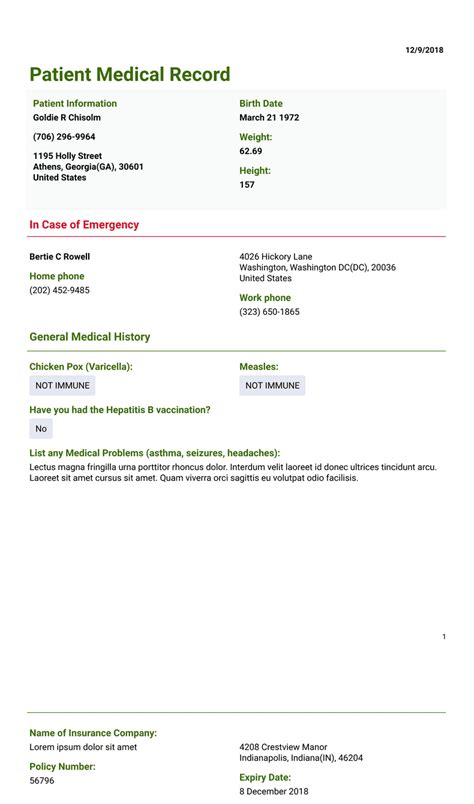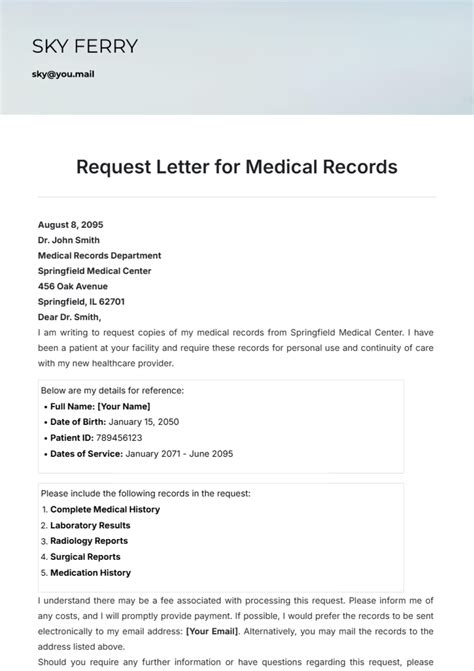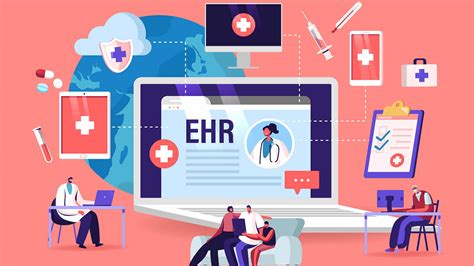Intro
Access medical records easily with our guide, simplifying healthcare management through secure online portals, HIPAA compliance, and efficient record retrieval, making patient data accessible and convenient.
Requesting medical records can be a daunting task, especially when dealing with complex healthcare systems. However, having access to your medical records is essential for managing your health, making informed decisions, and ensuring continuity of care. In recent years, advancements in technology and changes in healthcare policies have made it easier for patients to request and obtain their medical records. This article will guide you through the process of requesting medical records, highlighting the importance of accessibility, and providing tips for a seamless experience.
The ability to access medical records is a fundamental right of patients, and it is crucial for maintaining transparency and trust in the healthcare system. By having control over their medical information, patients can take a more active role in their healthcare, making it easier to switch healthcare providers, track their medical history, and identify any errors or discrepancies in their records. Moreover, accessing medical records can also facilitate research, quality improvement, and public health initiatives.
The process of requesting medical records may vary depending on the healthcare provider, hospital, or medical facility. Typically, patients can request their medical records by submitting a written request, filling out a form, or making a phone call. Some healthcare providers may also offer online portals or electronic health record (EHR) systems, allowing patients to access their medical records digitally. It is essential to note that patients may need to provide identification, sign a release form, or pay a fee to obtain their medical records.
Understanding Your Rights

The Health Insurance Portability and Accountability Act (HIPAA) of 1996 gives patients the right to access and obtain a copy of their medical records. HIPAA requires healthcare providers to provide patients with a copy of their medical records within 30 days of the request, and patients may be charged a reasonable fee for the copying and mailing of the records. It is essential to understand your rights under HIPAA and to know how to exercise them when requesting medical records.
Key Provisions of HIPAA
The key provisions of HIPAA related to medical records include: * The right to access and obtain a copy of medical records * The right to request an amendment to medical records * The right to an accounting of disclosures of medical records * The right to request restrictions on the use and disclosure of medical records * The right to file a complaint with the Office for Civil Rights (OCR) if there is a violation of HIPAARequesting Medical Records

To request medical records, patients typically need to follow these steps:
- Identify the healthcare provider or medical facility that has the records
- Submit a written request or fill out a form
- Provide identification and sign a release form
- Pay a reasonable fee for the copying and mailing of the records
- Wait for the healthcare provider to respond and provide the records
Tips for Requesting Medical Records
Some tips for requesting medical records include: * Be clear and specific about the records you are requesting * Provide all required information and identification * Follow up with the healthcare provider if you do not receive the records within the specified timeframe * Keep a copy of your request and any subsequent correspondence * Consider using an online portal or EHR system if availableElectronic Health Records (EHRs)

EHRs have revolutionized the way medical records are stored, accessed, and shared. EHRs offer numerous benefits, including improved accuracy, increased efficiency, and enhanced patient engagement. With EHRs, patients can access their medical records online, communicate with healthcare providers, and take a more active role in their healthcare.
Benefits of EHRs
The benefits of EHRs include: * Improved accuracy and reduced errors * Increased efficiency and productivity * Enhanced patient engagement and empowerment * Better coordination of care and communication among healthcare providers * Improved public health and research initiativesChallenges and Limitations

Despite the advancements in medical records management, there are still challenges and limitations that patients may encounter. These include:
- Complexity and variability in medical records systems
- Limited accessibility and interoperability
- Concerns about data security and privacy
- Disparities in healthcare and health information technology
Addressing Challenges and Limitations
To address these challenges and limitations, healthcare providers, policymakers, and patients must work together to: * Develop and implement standardized medical records systems * Improve accessibility and interoperability * Enhance data security and privacy measures * Address disparities in healthcare and health information technologyBest Practices for Managing Medical Records

To ensure the effective management of medical records, healthcare providers and patients should follow best practices, including:
- Maintaining accurate and up-to-date records
- Ensuring confidentiality and security
- Providing clear and concise communication
- Encouraging patient engagement and empowerment
- Staying informed about changes in healthcare policies and technologies
Importance of Patient Engagement
Patient engagement is critical for effective medical records management. Patients should: * Take an active role in their healthcare * Ask questions and seek clarification * Review and verify the accuracy of their medical records * Provide feedback and suggestions for improvement * Stay informed about their health and healthcare optionsFuture Directions

The future of medical records management holds much promise, with emerging technologies and innovations offering new opportunities for improvement. Some potential future directions include:
- Increased use of artificial intelligence and machine learning
- Development of more sophisticated EHR systems
- Expansion of telehealth and remote monitoring
- Greater emphasis on patient-centered care and engagement
- Improved data analytics and research initiatives
Implications for Healthcare
The implications of these future directions for healthcare are significant, with potential benefits including: * Improved health outcomes and quality of care * Enhanced patient satisfaction and engagement * Increased efficiency and productivity * Better coordination of care and communication among healthcare providers * Improved public health and research initiativesWhat is the purpose of the Health Insurance Portability and Accountability Act (HIPAA)?
+The purpose of HIPAA is to provide national standards for protecting the privacy and security of individuals' medical records and personal health information.
How can I request my medical records?
+You can request your medical records by submitting a written request, filling out a form, or making a phone call to your healthcare provider. You may need to provide identification, sign a release form, and pay a reasonable fee for the copying and mailing of the records.
What are the benefits of electronic health records (EHRs)?
+The benefits of EHRs include improved accuracy, increased efficiency, enhanced patient engagement, better coordination of care, and improved public health and research initiatives.
How can I ensure the security and confidentiality of my medical records?
+You can ensure the security and confidentiality of your medical records by verifying the identity of individuals who request access to your records, using secure online portals or EHR systems, and reporting any suspicious activity or breaches to your healthcare provider or the Office for Civil Rights (OCR).
What are the potential future directions for medical records management?
+The potential future directions for medical records management include increased use of artificial intelligence and machine learning, development of more sophisticated EHR systems, expansion of telehealth and remote monitoring, greater emphasis on patient-centered care and engagement, and improved data analytics and research initiatives.
In conclusion, requesting medical records is an essential step in managing your health and ensuring continuity of care. By understanding your rights, following best practices, and staying informed about changes in healthcare policies and technologies, you can navigate the process of requesting medical records with confidence. We encourage you to share your experiences, ask questions, and provide feedback on this topic. Your input is invaluable in helping us improve the quality and accessibility of medical records management.
